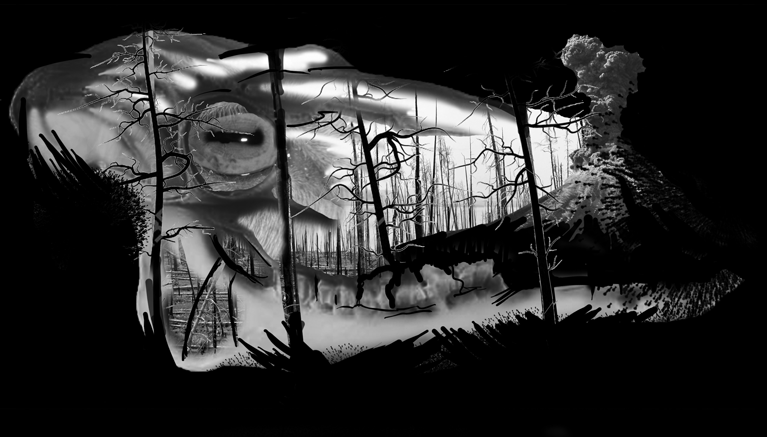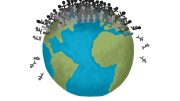The world is burning.
Over the summer, for days, the sun was veiled in smoke, a gibbous and hideous orange. At midday you could look directly at it. An old neighbour commented that he had not seen such a thing since the eruption of Mount St. Helens. That was the first time the sun was dimmed, when it was fires in Saskatchewan and the Northwest Territories.
Later the smoke returned. The rainforests of Washington were dry, dying, and burning. At midday, near Riding Mountain, the smoke lingered in the valleys like mist. The horizon was indistinct, and the birds seemed loath to fly.
Bad things coming
As the years go on, more and more forests will burn. More and more days will be shrouded in smoke. Ecological collapse, brought on by climate change, will continue for the rest of our lives – probably for many centuries – getting continuously worse. This is the new business as usual: endless death and destruction, the unravelling of the thread of life which has allowed our species to flourish.
Climate change has been brought on by centuries of unhindered industry and capitalism. Simply put, we have injected so many greenhouse gases in the atmosphere that we have upset a balance that took 3.8 billion years or so to develop.
If it were only a matter of greenhouse gases, we might have a snowball’s hope in hell of pulling through, of reversing the course. But it’s quite a bit worse than that. The greenhouse gases started the process, but the process is now self-perpetuating. The climate is a dynamic system that has been put out of balance, and it will seek a new equilibrium.
The greenhouse gases have raised the average temperature of the earth. But that rise in temperature has set off a whole series of positive feedback loops, which themselves now contribute to climate change.
The disappearance of sea ice in the north causes more heat to be retained, thus accelerating warming. The increase in summer temperatures causes permafrost to melt, venting methane into the air, thus further accelerating warming. Even if we were today to stop the emission of greenhouse gases (our governments cannot even commit to meaningful reductions over the course of decades), the positive feedback loops that we have kickstarted cannot be stopped.
The damage done to the earth not directly caused by warming – the acidification of oceans, the loss of arable soil, the cutting down of carbon-sequestering forests – weaken the very systems that might play a part in offsetting the damages done by humans. Not only have we set our house on fire, we got rid of the fire alarm and extinguishers long ago.
Every plant yielding seed
Plants are the foundation of any ecology; we have a bad habit of overlooking them as essential to our well-being. All animals, including humans, depend on them, and will suffer as surely as us as climate change proceeds. Imagine the vast farmlands we all depend on – and which in turn depend on stable climatic conditions – dead. It does not take great imagination to picture the suffering that will follow.
Unlike animals, plants cannot move quickly. If conditions change rapidly to something unsuitable for them, they will die. If they cannot disperse seeds far and quickly enough to keep pace with a shifting climate, they will become extinct.
Mature ecosystems take many years to develop; individual large trees are usually hundreds of years old. There will always be plant life, even in a changing climate, but it will be young, sickly, weedy, uncomplex life; the lowest common denominator. The world will be poor where it was once wealthy.
As this diminishment of the richness of the natural world proceeds, human society will suffer a similar fate. Even now, we have abandoned as useless most of the finer arts our ancestors made, trading beauty and subtlety for cheapness and convenience. In a world of shrinking food resources, massive human migrations, and extreme weather, of wars fought over dwindling resources, can there be any doubt what our society will come to be?
As weeds replace the ancient forests, so it will be with us: “The best lack all conviction, while the worst are full of passionate intensity.” Even in a stable, generous climate, humans are prone to war, genocide, and cruelty. Dark inertia will take terrible forms, which will do nothing to stop the ecological ruin around us.
Appropriate lifestyles
The future before us is bleak. The myth of progress is just that – a myth. There’s no cosmic law declaring that the future will be better than the present. Look around you – are there any signs that as a culture, we accept what is only the logical result of our actions? Sooner or later, we’re going to have to change our lifestyles. We should start now, while there’s still time to figure out the best way to live.
I can’t dictate to others what that looks like, and I’ll never be in a position to guide the course of society. But it’s not hard to imagine a very different lifestyle from what most people in our society live, one that would not only be more spiritually fulfilling, but significantly less harmful to the world around us. It would only become easier, as more and more people adopted it.
Purposefully spare, so as to consume few resources and generate virtually no waste. This means not driving or taking planes. This means not buying new things. This means eating very little meat, and much less food generally than we now consume. Constantly evolving and being fine-tuned so that through the years there is a shrinking, rather than expansion, of one’s ecological footprint. Avoiding any of the more vulgar aspects of our culture – anything with the word “celebrity” is a good start – which do nothing other than instil the desire to consume.
This would result in a massive amount of free time, since such a lifestyle would require less money to maintain, and thus fewer hours worked. This free time can be dedicated to living mindfully: meditation, reading, cultivating of personal interests (I’ve been teaching myself contact juggling), creating art, going for walks. Things that require very few resources, produce no waste, and make the lives of each individual, and their whole social circle, richer.
A life of poverty by our current standards – so that it can more easily be rich in spirit, and just in actions. I think it’s a good trade-off, and I encourage everyone to consider doing this, to whatever degree they’re able. If enough people give up on something bad it can make a difference; at this point, it seems like individual sacrifice is our best hope. And if not – living a life focused on living lightly and doing no harm is its own reward.



